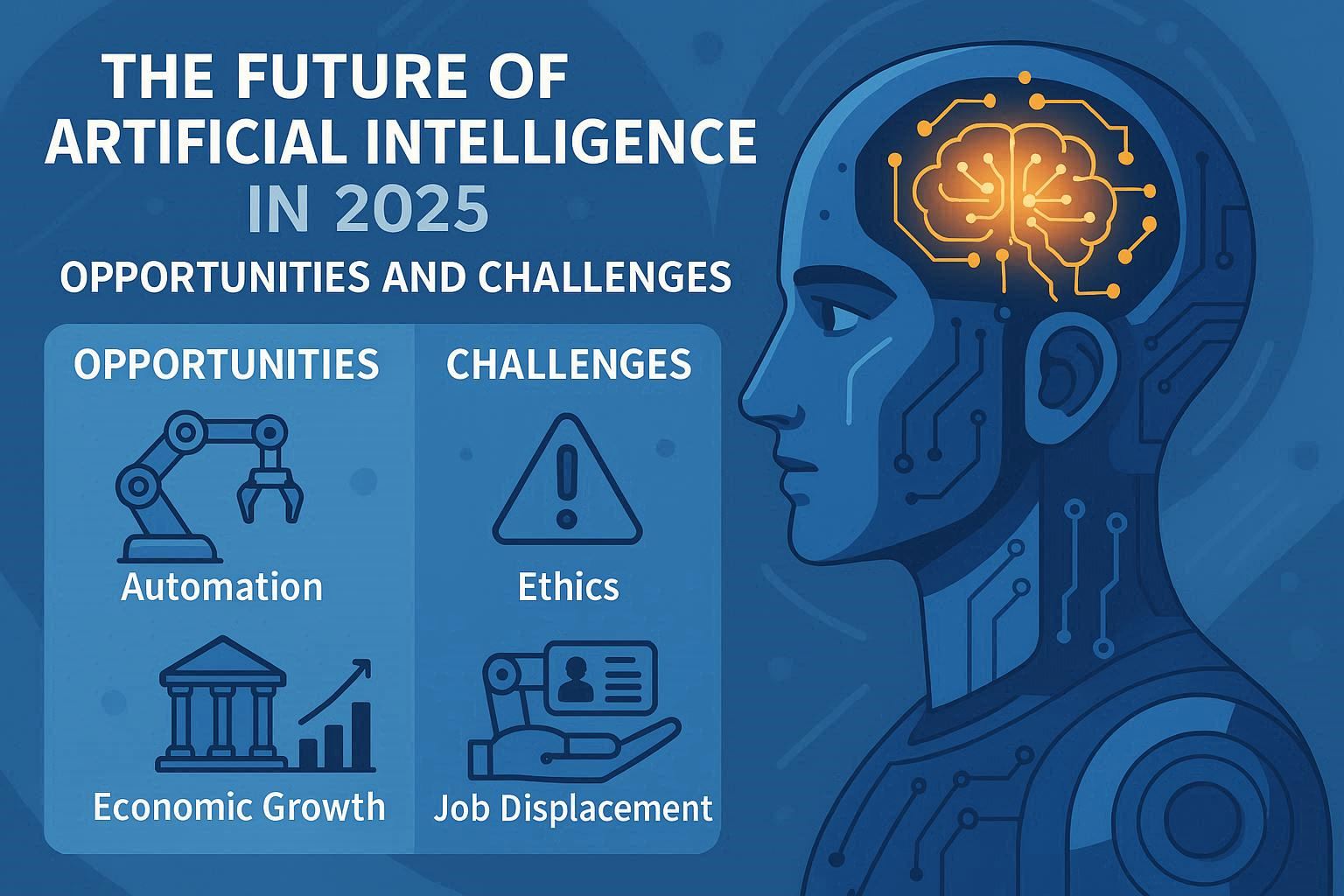Artificial Intelligence (AI) is no longer just a futuristic concept—it is now a driving force that shapes economies, industries, and everyday life. From voice assistants like Siri and Alexa to advanced machine learning models in healthcare and finance, AI has become an integral part of modern society. As we move into 2025, AI continues to evolve, offering both incredible opportunities and complex challenges.
This article explores how AI is transforming industries, the benefits it provides, the ethical and social concerns it raises, and what the future of AI may look like in the coming decade.
1. The Growth of Artificial Intelligence
In the last decade, AI has grown from experimental research into real-world applications. Businesses across the globe are leveraging AI to automate tasks, enhance decision-making, and personalize customer experiences. According to global reports, AI investment reached record levels in 2024, with industries like healthcare, education, logistics, and entertainment leading the way.
Advances in natural language processing, computer vision, and predictive analytics are fueling new innovations that are reshaping how humans interact with technology. In 2025, AI is not just about automation—it is about creating smarter, adaptive systems that learn and improve over time.
2. Opportunities Offered by AI
2.1 Transforming Healthcare – AI is revolutionizing healthcare by enabling early disease detection, personalized treatment plans, and faster drug discovery. Medical imaging powered by AI can identify health issues such as cancer or heart disease with remarkable accuracy. AI-powered virtual assistants are also helping patients manage chronic conditions and access reliable health information.
2.2 Boosting Business Efficiency – Companies are using AI to streamline operations, optimize supply chains, and improve customer service. Chatbots and virtual agents provide instant responses to customer queries, while predictive analytics help organizations anticipate market trends and consumer behavior. AI also plays a vital role in fraud detection, making financial transactions safer.
2.3 Enhancing Education – AI-driven tools are making education more accessible and personalized. Adaptive learning platforms tailor lessons to individual student needs, while AI tutors assist with homework and exam preparation. In 2025, AI-powered translation systems also allow students worldwide to access educational resources in their native languages.
2.4 Driving Smart Cities – Urban areas are adopting AI to improve traffic management, reduce pollution, and optimize energy usage. AI-enabled sensors and systems help cities become safer, greener, and more efficient. This reduces costs for governments and enhances the quality of life for citizens.
2.5 Revolutionizing Entertainment – From AI-generated music and films to personalized content recommendations on streaming platforms, artificial intelligence is reshaping how people consume entertainment. Gaming industries are also integrating AI to create smarter, more adaptive gameplay experiences.
3. Challenges and Risks of AI
3.1 Ethical Concerns – As AI becomes more powerful, ethical questions arise. Who is responsible when an AI makes a mistake? Should AI systems be allowed to make life-changing decisions, such as in hiring or legal judgments? Ensuring fairness, transparency, and accountability in AI systems is one of the biggest challenges of 2025.
3.2 Job Displacement – Automation powered by AI threatens traditional jobs, especially in manufacturing, customer service, and transportation. While AI creates new roles in data science and programming, there is growing concern about the gap between those who benefit from AI and those who lose their jobs due to automation.
3.3 Data Privacy and Security – AI relies on massive amounts of data, raising concerns about personal privacy. Sensitive information, if misused, can lead to identity theft, surveillance, or manipulation. Governments and organizations must strike a balance between innovation and protection of individual rights.
3.4 Bias and Discrimination – AI systems are only as unbiased as the data they are trained on. When historical data reflects human biases, AI can unintentionally amplify them. This has already been seen in recruitment tools and facial recognition software, sparking debates on how to create fair AI systems.
3.5 Dependency on Technology – As society becomes increasingly reliant on AI, there is a risk of over-dependence. If AI systems fail or are attacked by cybercriminals, the consequences could be devastating for critical infrastructure like energy, healthcare, or transportation.
4. The Future of AI in 2025 and Beyond
4.1 Human-AI Collaboration – The future will not be about AI replacing humans but about humans and AI working together. In industries like healthcare, education, and business, AI will serve as a powerful assistant, enhancing human abilities rather than eliminating them.
4.2 Regulation and Governance – To ensure AI is used responsibly, governments worldwide are developing regulations for data usage, transparency, and accountability. By 2025, international collaboration is expected to play a critical role in establishing ethical standards for AI.
4.3 AI in Daily Life – Smart homes, autonomous vehicles, and personal AI assistants will become more common. These technologies will simplify daily routines, improve convenience, and provide new ways to interact with the digital world.
4.4 Sustainability and AI – AI can help tackle global challenges such as climate change by optimizing energy use, predicting natural disasters, and supporting sustainable agriculture. By aligning AI with environmental goals, technology can become a tool for global good.
4.5 Continued Innovation – Emerging fields like quantum computing and neuromorphic engineering will push AI to new heights. These advancements could lead to breakthroughs in solving problems that are currently beyond human capability, from curing complex diseases to designing smarter infrastructure.
Conclusion
Artificial Intelligence in 2025 represents both an opportunity and a challenge. It offers immense potential to transform healthcare, education, business, and entertainment while also raising pressing ethical, social, and economic concerns. The future of AI will depend on how society manages its development—ensuring fairness, security, and responsible use.
As we step further into the digital age, one thing is clear: AI is here to stay. Companies, governments, and individuals who embrace AI responsibly will not only thrive in the years to come but also shape a smarter, more connected future for humanity.

